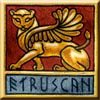
Hinthial is an Etruscan Goddess Who is shown with Turan, the Etruscan Goddess of love. On an engraved mirror-back, Hinthial is shown with Turan, Munthuch, and Zipu attending to the ornamentation of Malavisch, who it appears is being prepared for a wedding. Hinthial stands behind Malavisch and holds a mirror while the other Goddesses see to Her hair and makeup. Hinthial is draped in a heavy cloak that hides Her contours, unlike Munthuch and Zipu, whose chitons are quite transparent. She wears a heavy wreath and appears to be older than the other attendants, much as Turan on the right-hand side does. The mirror She holds is a little puzzling as it does not seem to be pointed in a useful manner regarding the preparations being made on Malaviskh; about the only thing Hinthial could be doing with it is looking at Her own reflection. Her name, however, lends an ominous note to the scene of anticipation: it means "Ghost", "Shadow", or "Apparition". Related words are hinth, "below, beneath; relating to the Infernal regions", hinthiu "underground, infernal", and hintha "seized by a vision". On another mirror an Underworld scene is depicted which shows Turms Atias, or Infernal Mercury (the Greek Hermes Psychopompos, who guides the soul to the Underworld) with the soul of the seer Tiresias, who is labelled Hinthial Terasias, "the Ghost of Tiresias". "Hinthial" is also used as a word for the ghost or spirit of the individual that every person possessed; perhaps this was the Etruscan equivalent of what the Romans would call a woman's juno or a man's genius. After death, this hinthial or shadow-form could return and cause trouble if not given offerings. If this has any bearing on Her picture on the Malavisch mirror I do not know how to interpret it; even given that She is heavily draped and standing in the background Hinthial does not seem at all foreboding, and the presence of a ghost or shadow of the bride does not seem appropriate to the rest of the scene. Then again, perhaps that is all wildly overinterpreted: the woman with the mirror may simply be looking at her reflection, which was just one more meaning of the word hinthial. |
|
|



